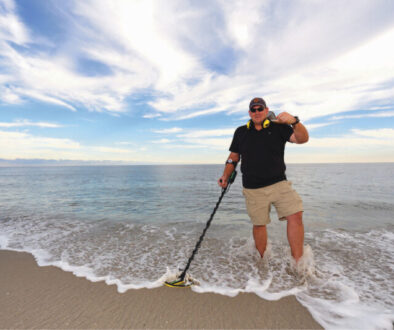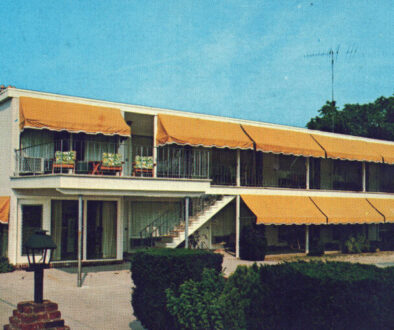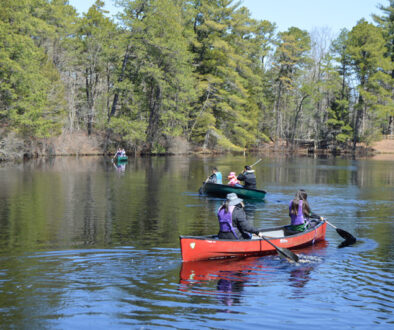A Century of Service

Back in 1915 in Detroit, Michigan, a group of businessmen formed an organization then called the Supreme Lodge Benevolent Order of Brothers, with the initial goal of networking. Within a year, they changed the name to “Kiwanis,” which is from the Algonquian Native American language meaning “to build.” By 1919, the goal was changed as well—to providing services for children.
Now, nearly 80 nations boast Kiwanis clubs. The Kiwanis Club of Cape May is one of those and this year is celebrating its 100th Anniversary.
The Early Days
Founded in 1924, The Kiwanis Club of Cape May originally held its meetings in the Colton Court Motel. According to Bob Morris, a past president and member of the group for 35 years, the organization was sponsoring Boy Scouts and Girl Scouts in Cape May and decided that the club needed its own clubhouse.


“During the Depression, the government didn’t have any money. So they were auctioning off a lot of their assets,” explains Morris. “One of these was a lifesaving station in Cape May.” The station was no longer needed since the Coast Guard had taken over those duties. The caveat was that if you bought the building, you had to move it.
“The Kiwanis Club bought a property at the end of Cape May. There was really nothing there at the time, a few houses here and there,” says Morris. “Then they sent Nick Swain of Swain’s Hardware Store to get it. He got it for [just over] $100.”
The Kiwanis moved the clubhouse to its present location at 1041 Beach Avenue. And for many decades, it also served as the clubhouse for the Boy Scouts and Girl Scouts.
When the Kiwanis Club was supporting the Boy Scouts and Girl Scouts, they even bought a school bus that would transport the children to Scout Camp. “It was a big thing in the community. When the kids would all leave, the parents would be waving to them—it was quite a time,” recalls Morris.


In the 1940s the Kiwanis also supported the war effort, says Bob Elwell, past president, and Kiwanis member for about 30 years. “During the war, they had scrap drives, which meant they collected newspapers, cardboard, and scrap iron. They also sold war bonds,” says Elwell. “Way back when polio was around, they raised money to buy an iron lung as well.”
The scouts used the clubhouse until the 1990s, and during that time it also became—and still remains—the place for the Kiwanis Club to hold its weekly evening meetings. Throughout the years, the organization has kept up working with the community and raising funds for various projects.
No Politics—Ever
Morris says that one of the early bylaws of the Kiwanis Club of Cape May is that the members can’t talk about politics at all during the meetings—ever.
“This goes back to when Herbert Hoover and Franklin Delano Roosevelt were running against one another for president during the Great Depression. The story goes that someone made a joke about Hoover, there were arguments, and half the club walked out. They lost half their membership in one night!” quips Morris. “So, it became part of our bylaws. If a political discussion ever begins, someone will raise their hand and say something like, ‘Time to move to the next subject.’”

A Postcard that Made a Difference
About 10 years ago, when Kathleen Finley and her husband moved to Cape May for their retirement, she admits that she was lonely at first. At the time, all their friends lived about 90 minutes away. One day, serendipity occurred. Finley received a postcard in the mail that read, “Would you like to get involved in the community? Would you like to help children? Would you like to meet new friends?”
For this former teacher and reading specialist of 32 years, this was exactly what she was looking for. The Finleys attended the next Kiwanis meeting and joined immediately. “I then felt very blessed because I still have my old friends—an hour-and-a-half away—but then I have so many new ones,” Finley says. “And, of course, so many meaningful projects that I’m involved with here. I feel like I’m having a great retirement!”
Finley is the current president, the sixth woman in Cape May to hold the position. Until the early 1990s, says Morris, the Kiwanis was an all-male club. But admitting women made a huge difference. “Now, women make up 50% of the club, and many of them hold important leadership spots,” he says. “Without them, we probably wouldn’t have the club anymore.”
Educational Programs for Children
The Kiwanis Club runs several educational programs for kids in the area. One, Finley says, is called the BUG program, which stands for Bringing Up Grades. “We have four elementary schools involved in Cape May City, West Cape May, and Lower Township,” she explains. “The children are all given information that after the first marking period, if they bring up their grades or maintain their good grades for the second marking period, they will be awarded a certificate from the Kiwanis as well as a little prize.”
The ceremonies are held in January, April, and June. While they reward the children who bring up or keep up their grades, Finley says that the Kiwanis also make sure to support those kids who didn’t. “We tell them to keep up the good work and not to feel disappointed if they didn’t get acknowledgements that day because we’ll be coming back after the next marking period,” she says. “We want to give them hope!”
In the past, students have received little gifts like sunglasses, a food coupon, and a little bug that reads “Kiwanis BUG” that they can attach to their backpacks or put on a keychain.
The Kiwanis also started a tutoring program called Toe by Toe that runs in two schools. Toe by Toe is designed to help elementary school students who need assistance with reading. Finley, having spent half her educational career as a reading specialist, set up the program, trained the tutors, and even opened it up to the community—so while some of the tutors are Kiwanis members, others aren’t. The Kiwanis purchase the books needed for the program.
Tutors meet with specific students twice a week for 30 minutes each time. Finley not only organizes the program but acts as the liaison between the schools and the tutors. “We believe that every little bit helps,” she says.
Kiwanis also has service-oriented clubs for students of all ages. “Our motto is ‘Serving the children of the world,’” says Morris. “So, what we try to do is teach leadership skills, community service, how to be a good steward of your neighborhood, and even how to hold a fundraiser.”
In elementary schools, they have the K-Kids program, which meets twice a month and teaches children about the importance of service in the community and what they can do to make their communities better. As children move up to the next school level, they can continue their service in different Kiwanis clubs. In middle school, they become members of the Builders Club; in high school they join the Key Club; in college, it’s referred to as Circle K.
“For the Key Club, we’ll send students to a leadership camp held at the College of New Jersey or whichever college is sponsoring it that year. For five days, the students take classes in team building and learn other skills that will make them better citizens,” Morris says.
Teaching about Patriotism and the American Flag
Another prominent activity for the Kiwanis is the Flag-Lowering Ceremony that takes place seven days a week—from Memorial Day through September 11th—in the pavilion at the end of Beach Avenue. The time of the ceremony changes slightly each night to correspond with the sunset.
Elwell, who is the head of the Flag-Lowering Committee, says that each evening, just before sunset, they gather children—usually those walking at that end of the boardwalk with their parents—and ask if they would like to take part. The kids come into the pavilion near the flagpole, and two or three Kiwanis members teach them a bit about the etiquette of the American flag—including teaching them how to properly fold a flag. “In about 10 minutes, the children learn how to fold a flag, then they help fold it, receive a certificate that they’ve taken part in the ceremony (that’s signed by both the mayor of Cape May as well as the current president of the Kiwanis Club), as well as a little flag pin,” explains Elwell.
“We give a talk, introduce the children, and then play Kate Smith singing ‘God Bless America.’ She’s been there every night,” jokes Elwell. They then play “Taps” while the flag is lowered. The ceremony has been held for more than 20 years.
Sometimes, Elwell says, they will fly a flag that was once draped over on a veteran’s casket. The flag flies for the entire day, and then family and friends of the veteran attend the Flag-Lowering Ceremony. Sometimes, Elwell says, they will say a few words about the person.
“Picture the flag coming down as the sun is dropping into Delaware Bay. It’s a pretty moving ceremony,” he says. “Sometimes, there are actually tears in their eyes because it’s just such a moving thing to have their relative’s flag being lowered and refolded, as the last time it would have been done was at their graves.”
But there’s more behind the ceremony.
“Our goal is to teach the younger generations about the etiquette of the flag as well as about patriotism. We hope that when they go home, they’ll remember it,” Elwell says. “The families love it, and they’re out there taking photographs of their kids taking part in the ceremony. It’s not only nice PR for the city of Cape May, but also a nice thing to do for the families, the community, and the nearby resorts.”
Helping Those Who Need It
During the pandemic, the Kiwanis Club began their Feeding Our Neighbors program. Members collect everything from food to personal need items to kitchen things such as paper towels. “We then distribute everything we collect to three different food pantries in the area,” says Finley.
In addition, they have a few members who will volunteer twice a month to pick up bags of food and deliver them directly to families who are in need in the area. The number of bags of food they receive is based on their income.
Bike at Night
Morris says that the Kiwanis began this program after members kept coming to meetings and saying that they nearly ran into a child on a bike because, at night, they were difficult to see. “We decided to do something about it,” says Morris. “We bought front and rear bike lights for every school kid in Cape May, West Cape May, and we gave them out in June that first year.”
That was eight years ago, and in true Kiwanis fashion, they didn’t just give out the lights. They also met with the kids, explained about the importance of them having lights on their bicycles, and then distributed them for free. “We always buy about 500 sets of lights, and we continue to provide them for free as long as they last,” says Morris. “We also give them to the police who ride bicycles. So, if they see somebody riding at night who doesn’t have lights, they can give them some.”
“We always try to do things like this,” he adds. “We do beach cleanups. We’ve adopted a road that we keep clean. We do everything we can to improve our community.”
Improving the Landscape
In the early 1990s, Morris says, saltwater intrusion started to become a problem in Cape May. To get a grant for a desalination plant, Cape May needed to put in a garden containing native species of plants that don’t require watering. This is the water conservation garden that is located where Madison Avenue and Cape May Avenue meet.
“All the bushes and flowers and everything else in there don’t need much water,” Morris explains. “The Kiwanis Club has been maintaining it ever since it was established.” The garden is named the Mike Shouvlin Water Conservation Garden in honor of the first master gardener, who has since passed away. Over the years, there have been three master gardeners in charge of the care of it. After Mike Shouvlin, the second was Al Conly, and the current gardener is Morris’ brother, Jim Morris.

Another city park, Kiwanis Community Park, is located on Madison Avenue right across from the water tower. The city recently upgraded the park after receiving grants to make it accessible in accordance with requirements of the Americans with Disabilities Act. Handicapped bathrooms and all the playground equipment are accessible for those with physical challenges. Morris adds that there are new walkways as well as new lighting.
The city also upgraded and added new flooring to the park’s Nick Swain Gazebo, which the Kiwanis paid to have constructed years ago. “It really looks a lot nicer,” says Morris.
Pumpkins and Pets and Parades, Oh My!
The other main activities that the Kiwanis sponsors are the Pumpkin Painting Project in October and the Annual Pet Parade.
“At Halloween, we take pumpkins into the local schools, and the kids decorate them any way they want,” says Elwell. “Then we have a judging committee that votes on the best-decorated pumpkins, and the winners receive ribbons and stuff. It’s just a fun thing for the kids. The Kiwanis have been doing those types of things since the group began!”
The annual Pet Parade takes place in October as well. Children and adults are invited to bring their pets to the Emlen Physick Estate. While the pets don’t have to be dressed up, it helps if the owners want them to win a prize.
The pets are placed in different categories, and the owners parade them around the estate. Judges choose the winners, and everyone has fun. “It’s been a long-standing tradition for us, and a lot of fun for sure,” says Finley.
That sounds like most Kiwanis activities, and Cape May is better for it.



